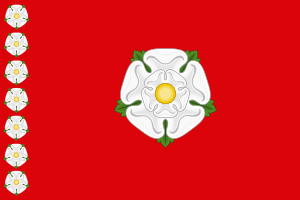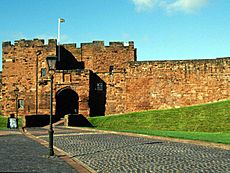Manchester Regiment (Jacobite) facts for kids
Quick facts for kids The Manchester Regiment |
|
|---|---|

Personal standard of Charles Stuart
|
|
| Active | 1745–1746 |
| Country | |
| Type | Infantry |
| Size | One battalion, maximum 300 men |
| Engagements | 1745 Jacobite Rising Clifton Moor Skirmish 2nd Siege of Carlisle |
| Commanders | |
| Colonel of the Regiment |
Francis Towneley |
The Manchester Regiment was a special army unit formed during the Jacobite Rising of 1745. This was a time when Charles Edward Stuart, also known as Bonnie Prince Charlie, tried to take back the British throne for his family. The Manchester Regiment was unique because it was the only group of English soldiers who joined Charles's army in large numbers. They were formed in late November 1745. Most of them were captured in December at Carlisle. Sadly, many of their officers and soldiers were executed in 1746.
Contents
The Jacobite Uprising of 1745
In July 1745, Charles Edward Stuart arrived in Scotland. By September, he had captured Edinburgh, the capital, and won a battle against the government army. After much discussion, his army of about 5,000 men marched into England in early November. Charles believed many English people would support him.
On November 10, the Jacobite army reached Carlisle, a city in England. Carlisle surrendered five days later. Charles left a small group of soldiers there and continued south. They reached Preston on November 26 and then Manchester on November 28. Even though large crowds came to see them, not many people joined their army. Preston, which had supported the Jacobites in 1715, only provided three new soldiers.
Manchester was different. It was a very busy and growing town. It also had many people who secretly supported the Stuart family. This made it a good place for Charles to find new soldiers.
Forming the Manchester Regiment

The Manchester Regiment started with some English officers and soldiers from another Jacobite unit. They also had 39 Catholic men from Lancashire. At first, they called themselves the "English Regiment." But they soon changed their name to "Manchester" to make the town happy.
Francis Towneley, a Catholic from Lancashire, became the colonel (leader) of the regiment. He had served in the French army before. Some people thought he was a good leader, but others found him quick-tempered. One officer, James Bradshaw, even left to join a different regiment because of him.
William Vaughan, another Catholic, became the second-in-command. Other important officers included Tom Syddall, a barber, and James Dawson, a former student. Three sons of Thomas Deacon also joined. Deacon was a strong supporter of the Jacobites. His son, Charles Deacon, helped sign up new soldiers.
Most of the new soldiers were not actually from Manchester itself. They came from nearby villages. About 200 new recruits joined, which was fewer than Charles had hoped for. One reason was that the officers in charge of recruiting were not very high-ranking. They needed more important people with money to attract and pay soldiers.
Many people thought the lack of French soldiers made English people less eager to join. After an earlier uprising in 1715, fewer English people supported the Jacobite cause. Some people called the new recruits "common fellows" or "vagabonds." But they were actually a mix of tradesmen, farmers, and weavers. Most were young, in their late teens or early twenties, and many were Catholic.
The regiment's flags were said to have the words "Liberty" and "Property" on one side, and "Church" and "Country" on the other. New recruits wore blue and white ribbons to show they belonged to the regiment. They might have also received blue coats and tartan sashes, but this is uncertain since the unit only existed for a short time.
What Happened to the Regiment
Some soldiers received weapons in Macclesfield on December 1, but they were not well-trained. A special group of engineers helped fix roads. The Scottish Jacobites had only agreed to invade England because Charles promised them lots of English support. But this support didn't appear. So, at Derby on December 5, the Scottish leaders decided to retreat back to Scotland.
This decision made the English soldiers very sad. Many of them left the army. A few new soldiers joined on the way back, but not enough to replace those who had left. Some of Bradshaw's company might have fought in a small battle at Clifton Moor on December 18.
On December 19, the Jacobite army returned to Carlisle. Charles wanted to hold Carlisle to show he planned to return. Francis Towneley was put in charge of the town. The Manchester Regiment, now only about 115 men, stayed to guard Carlisle. They were joined by about 200 other soldiers, including some from the French-Irish army. Towneley might have hoped that having French-Irish soldiers with them would mean they would be treated as prisoners of war, not rebels, if captured.
A small group of Manchester Regiment soldiers, including James Bradshaw, continued with the main Jacobite army. They fought in the Battle of Culloden in April 1746. Meanwhile, government forces reached Carlisle on December 22. The castle surrendered on December 30. Most officers thought it was useless to keep fighting.
The French-Irish soldiers were treated as prisoners of war. But the Manchester Regiment soldiers were seen as rebels against the King. They were put on trial. On July 31, 1746, Francis Towneley and many other officers were executed in London. James Bradshaw, who was captured at Culloden, was executed later that year.
They were executed in a very harsh way, but by then, it was common to make sure they were dead first. Towneley was buried in a Catholic graveyard. The others were buried in a garden in London, where a plaque was placed in their memory in 2015.
More than a quarter of all the people executed for their part in the 1745 Rising were members of the Manchester Regiment. Some other soldiers were sent away to other countries or pardoned if they joined the British Army. A few managed to escape, like John Holker, who later started a successful business in France.
Images for kids
-
Carlisle Castle; the Manchester Regiment guarded this castle in December 1745.
 | George Robert Carruthers |
 | Patricia Bath |
 | Jan Ernst Matzeliger |
 | Alexander Miles |


